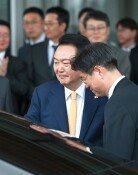[Opinion] Poli-fessor
The Analects of Confucius states, If there is justice in the world, you should partake in it. If there is none, you should live in isolation. This phrase has been frequently quoted as a principle of scholars participation in politics. In the Joseon Dynasty, the prevailing perception was that government posts and learning were not independent. It was only natural that scholars served in a government office, and the more knowledgeable a scholar, the higher his official rank. Probably because of such tradition, Korean scholars tend to actively participate in politics. For instance, it is said that the so-called poli-fessors are flocking to the camps of potential candidates, with the presidential election scheduled for this December.
The term poli-fessor, coined by combining politics and professor, refers to a professor who has either participated in politics or has made connection with the political circles in an effort to do so. The previous administrations appointed professors as prime ministers and ministers to complement their lack of legitimacy and tap into the expertise of the professors. Professors have become poli-fessors probably for a variety of reasons: to apply their academic conviction and insight or merely because they crave power or because they are frustrated with the limitations of the academic community. There were many poli-fessors who partnered with politicians in the presidential election in 2002.
Jeon Sang-in, a Seoul National University professor, categorizes political participation by scholars into four types: election camp participation, think-tank participation, NGO participation and like-minded community participation. Those who fall into the category of election camp participation often partner with candidates, developing election strategies. It is fair to say that poli-fessors who were part of the election camp of then presidential candidate Roh Moo-hyun were highly speculative. They ran high risks of a complete failure, but as it turned out, they hit the jackpot. The non-mainstream, lesser-known professors in Rohs camp assumed the major offices. They were bold in pursuing adventurous policies, producing side effects which brought about difficulty to the public.
In the U.S., it is only natural and is encouraged for intellectuals at universities and think tanks to hold government offices and then return to the academic community. Scholar-turned-public officials include former Secretaries of State Henry Alfred Kissinger and George Pratt Shultz, current Secretary of State Condoleezza Rice, former Labor Secretary Robert Reich, and former Treasury Secretary Larry Summers. However, there are few professors in the country who focus only on politics speculation while neglecting their main occupation such as research and lecturing. That is the difference between them and Korean poli-fessors.
Gwon Sun-taek, Editorial Writer, maypole@donga.com







